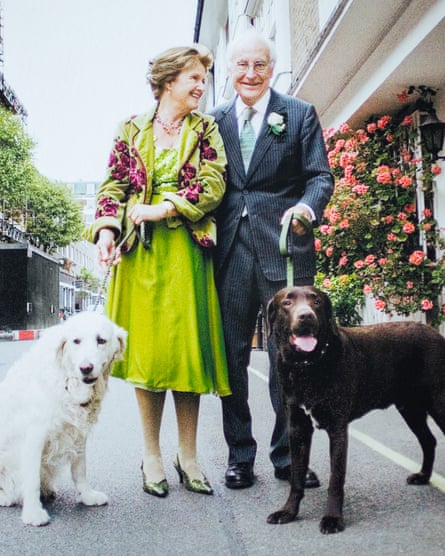
Virginia Lynch’s second husband liked to stay at home, so she went alone to bridge nights and concerts. At 72, on one of these solo excursions, she met the love of her life. For months, Lynch, who is now 87, had enjoyed chamber music concerts at a school near where they lived in Kent. Among the regulars was a couple. The woman, who was very beautiful, had Alzheimer’s. Lynch and the couple never spoke. “But I watched them and made up a story about the man in my head,” she says.
In April 2007, Lynch went to a concert in London. In the interval, she spotted the man, Alan, two rows in front.
“I was feeling quite cheerful and extrovert, and I went up and said: ‘Oh, hi! What are you doing here?’ He smiled – he had the most extraordinary smile – and asked me to have a drink with him … Everything suddenly came alive. I came alive.”
After the performance, Alan waited for her. They went to a pub, then he walked her to the station. “I remember saying to myself for days afterwards, ‘I can’t believe it. I can’t believe it.’”
“He pounded me with emails,” Lynch says. They knew nothing about each other, or about their marriages. Alan’s wife was by then in the late stages of Alzheimer’s, unable to feed herself or speak; Lynch’s husband seemed happy in his own company.
Lynch and Alan soon became close; she felt that she had found her soulmate. After his wife died, she and Alan married, in 2010. “I had never been in a relationship with somebody who just enclosed me with love. It was the most wonderful healing experience,” she says.
She especially loved Alan’s “extraordinary ability to know what I was feeling”.
Loneliness had been the overwhelming experience of Lynch’s childhood. The second of three children, she felt unvalued. “I longed to be loved by my mother. But my mother didn’t want me around,” she explains in her memoir, The Cloak. At 13, she went to boarding school. At 19, she joined a choir and fell for the conductor. They married and had five children, one of whom died as a baby. Lynch came to regard her first marriage as oppressive, and applied for a divorce when she was 52.
But why the fixation on a “love of her life”? Lynch starts to sing. “Some enchanted evening … da da dum … You will see a stranger across a crowded room. That’s the sort of romantic thing I’ve had in my head all my life. I was such a mixed-up girl. I was always looking for a person to impress my mother.”
In her 30s, Lynch became interested in psychoanalysis and after experiencing the benefits herself, trained as a psychotherapist and analytical psychologist. She describes Carl Jung’s idea of individuation as “the overwhelming passion” of her life. “What it means is individual development,” she says. “We’ve all got a golden string going through our lives. And you don’t ever get to the end of it.”
She and Alan were on holiday in Switzerland when she realised something was wrong. She consulted him on “some ordinary thing”, and was struck by “a quality missing in our interchange”.

Alan didn’t appear to know how she was feeling. “He was just like an ordinary person,” she says.
On their return to England, Alan was diagnosed with Alzheimer’s. “So the last years with him, I loved him. But of course I became a carer.”
Alan died in 2018. But Lynch still feels herself enfolded in Alan’s love. “And I still want that love,” she says. In Dorset, where she now lives, she has new friends and hobbies, and is chair of the local u3a organisation. “I’m a much more contented person than I would have been without Alan,” she says.
“Before I met him, I always had this sort of shaky feeling that nobody really cared what happened to me. Since we met, I haven’t had that feeling. He gave me something that was really missing. He gave me this feeling that I was lovable.”



